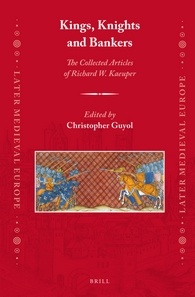Richard W. Kaeuper
Kings, Knights and Bankers: The collected articles of Richard W. Kaeuper, ed. by Christopher Guyol
(Brill, 2016) xv + 392 pp. $172
Kings, Knights and Bankers collects a substantial amount of material from the scholarship of Richard W Kaeuper: 20 articles from his long and productive career. Editor Christopher Guyol has organized and written introductions to this material so that it reflects the various interests and long evolution of Kaeuper’s thought. The result is a very meaty survey of several important subjects that Kaeuper has explored, and of the debates that he has contributed to.
There are four sections to this book: “The English Crown and Italian financiers;” “Law and disorder; “Chivalry and literature;” and “Holy warriors.” Although the sections differ considerably from each other, they also contain important unifying themes. This is a book about war, as seen from a variety of perspectives.
Kaeuper began as a historian of royal finance, as seen in the relationship between Italian bankers and the English crown. The articles on the subject are very detailed and clearly written. Kaeuper studied how banking practices made it possible for King Edward I of England to operate on a very large scale. The most expensive part of Edward I government was his ambitious military policy. This could be an extremely dry subject but Kaeuper here as always makes the subject come to life.
Part two, “Law and disorder,” is connected to the first by an interest in how ambitious warfare affected the rest of English society. Edward I in particular has long been seen as a very successful state builder, despite the fact that he did suffer some significant setbacks later in life.
Having become familiar with his studies of banking and royal finance, one might suspect that Kaeuper would emphasize the successes of the English government of the 14th century, yet Kaeuper’s research made him more aware of how the emphasis on warfare made domestic governance more difficult. Royal devotion to war made it less likely that the royal government would be attentive to peace at home and effective in enforcing order at home in England. Kaeuper’s research in this area may have begun in the archives that were so familiar to him but came to include literary works which reflected the attitudes and behaviour of local leaders towards the king as warmaker and peacekeeper
Part three, “Chivalry and literature,” discusses the subject that Kaeuper is perhaps best known for today the meaning that chivalry had for Knights in the later Middle Ages, and the practical consequences of their beliefs. Again we find Kaeuper using literature as an essential source. In tackling chivalry Kaeuper read vast amounts of medieval romance and other material known to military aristocrats (“knights”) and came away from that exercise much impressed by the autonomy of lay attitudes. Where many have seen Knightly values as very much influenced by and subordinate to clerical teachings about the proper role of warriors in a Christian society, Kaeuper has argued that medieval knights drew their own conclusions as to what God wanted them to do.
Part four, “Holy warriors,” including his most recent work, extends the argument of part three in describing what Kaeuper sees as the autonomous religious beliefs held by knights.
Editor Guyol notes that Kaeuper’s arguments and opinions in any of his chosen subject areas have not passed without criticism by equally capable scholars. For instance, that the body of beliefs and practices we call chivalry was a civilizing force has been accepted by many students of the Middle Ages. Kaeuper’s skepticism about the civilizing effect of knightly attitudes is not unchallenged. His extensive use of literary sources to recreate the actual values and throw light on the actual behavior of the military aristocracy has also been criticized. Yet the learning and the clear argumentation that Kaeuper brings to all the subjects he has examined makes his contribution to scholarly debate valuable even for those who are not completely convinced by his reconstruction.
I feel compelled to point out that one of the most important limitations of the usefulness this book has nothing to do with Kaeuper’s writing or scholarship. It is the extraordinary price the publisher has affixed to the book; even the price of the ebook is sky-high. We can easily imagine that scholars, young or established, might like consult this book. It is less easy to imagine that the book will be on the library shelves when they want to do so.
Steven Muhlberger
Nipissing University (retired)
[email protected]

